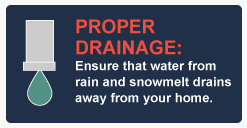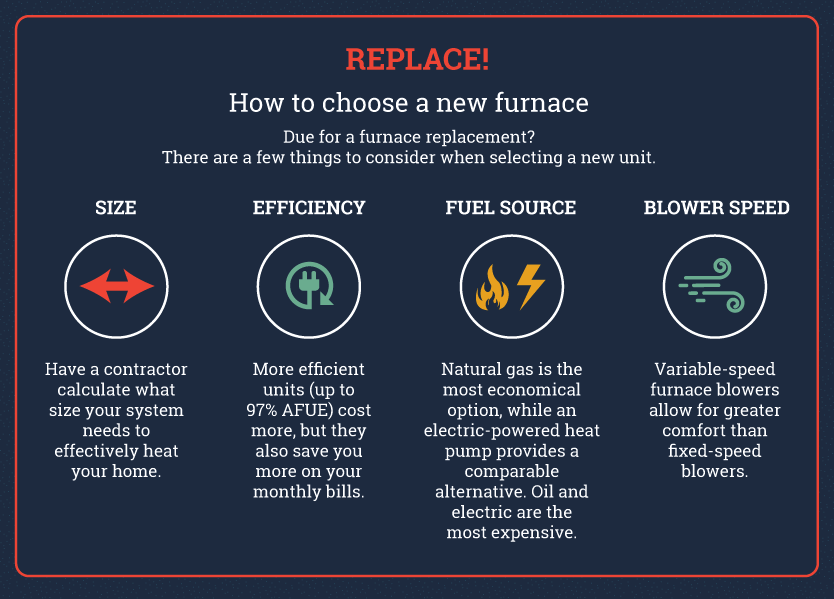Furnace Maintenance – Repair or Replace?
With the right furnace maintenance and care, a heating system can last decades. Manufacturers, however, recommend that you replace them every 15 to 20 years because new furnaces are more reliable and provide energy savings that make them worth the cost. When you have an older furnace or one that seems to need frequent repairs, knowing when it’s a good time to buy a replacement could save you money and prevent unnecessary stress.
Indications That You Might Need a New Furnace
Age
On average, furnaces last about 15 to 20 years. If you have an older furnace that requires more repairs than usual, upgrading to a newer system is a good idea.
Safety
If your furnace poses a safety hazard, replace it. One of the main concerns with faulty heating systems that use natural gas is carbon monoxide poisoning. Carbon monoxide is a colorless, odorless gas, so it’s a good idea to keep a carbon monoxide detector near the furnace and have a professional maintain the unit at least once a year. You can schedule an appointment with us here.
Warning signs of gas-related problems with a natural gas furnace include:
- A pilot light that’s yellow; it should be blue
- A flickering pilot light
- Soot streaks around the furnace
- Excess moisture on the windows and walls around a furnace
- Excessive rust on appliance jacks and flue pipes
Repair Costs
A furnace that works well should not need a repair more than once every two years. If you have a furnace that’s 10 years old or older, consider a replacement if the repair cost is 10 percent of the replacement cost. For example, if a repair is over $200 and new furnace is $2,000, a replacement may be more cost effective in the long run. Here’s how to troubleshoot your furnace.
If a furnace’s repair cost is 50 percent of the replacement cost, buy a new furnace, regardless of the current unit’s age. Similarly, if you’ve already spent about 50 percent of the replacement cost in furnace repairs, a new unit may ultimately be more cost effective, especially considering the tax benefits and increased energy efficiency savings that you may receive.
Energy Efficiency
A new furnace is considerably more energy efficient than one that is 10 years old, even if it works well. Older furnaces and those in need of repairs tend to use more energy, and your power bills will only increase with time.
When looking at new furnaces, pay attention to its AFUE (annual fuel utilization efficiency) rating—the higher the AFUE, the more efficient the unit. A furnace with an 80 percent AFUE, for example, uses 80 percent of the fuel consumed to heat a home. The remaining 20 percent goes up the flue. So, it only wastes 20 cents of every $1 spent to heat a home. If your current furnace has a 60 percent AFUE, for instance, and you upgrade to a unit with a 90 percent AFUE, you’ll save over $33 for every $100 that you spend on heating costs.
Don’t Procrastinate on Furnace Maintenance and Repairs
Annual furnace maintenance is great for a system tune-up so the furnace can run more efficiently and reliably throughout the year. During the maintenance process, the HVAC professional may also find smaller problems that are inexpensive to remedy before they turn into expensive or dangerous issues.
If you notice any of the following with your furnace, call a Portland HVAC professional soon:
- Strange sounds
- Your home feels cold or drafty, even when you turn up the heat
- Pilot light problems
- The furnace doesn’t turn on or stay on
- Your home is more dusty than usual
While it may seem easier to put off a furnace repair, doing so may:
- Put your family’s health and safety at risk: Never take a chance with appliances that use natural gas
- Be more expensive: Time has a way of turning small, inexpensive repairs into costly headaches
- Waste energy: Furnaces that don’t work well use more energy to heat a space
- Make your home feel uncomfortable: Why pay high energy bills when your home still feels drafty
If you have an older or problematic furnace, talk an HVAC specialist at AAA Heating & Cooling. We’ll assess your furnace’s current situation and history to make a recommendation that’s financially sound, keeps your family safe, and aligns with your needs. Get in touch with us today.
The worst time of year for your heating system to go on the fritz is the winter. Just as wind, snow, and ice cause long and short term damage to your home, the same could cause costly damage to an HVAC unit. Portland residents who take the simple yet necessary steps to protect and maintain their HVAC system during the coldest times of the year will maximize the unit’s life span, requiring less frequent repairs that can help save on monthly usage costs.
The Effects of Winter Weather on an HVAC in Portland
Gas Furnaces and Boilers
Some of the most vulnerable parts of a boiler and gas furnace are the unprotected exhaust and intake pipes that are located in the roof of your home or on a sidewall. If ice, snow, or frost melts and re-freezes in the exhaust or intake pipe, the system might shut down.
These types of heating units also have valves and controls that are vulnerable to water damage. Exposure to water can lead to hidden corrosion within the system and create reliability issues. In more severe cases, water damage could cause the appliance to catch fire. Always have an HVAC Portland professional inspect a unit if you suspect any water damage.
Heat Pumps
Rain or melting snow that drips from a roof or gutter system into a heat pump is particularly problematic if the water freezes on the coil fins and fan blades. This could cause an imbalance within the unit itself. When this occurs, you might notice unusual vibrations and noises coming from the unit or refrigeration leaks. In addition, fins could burst, the circuitry in the system may short, or components might burn-out.
In general, frost accumulating on heat pump coils is of no concern because the unit uses the refrigerant within it to absorb the change in temperature. When the refrigerant absorbs heat, the excess moisture sometimes builds up on the unit’s processing coils and freezes if the outside temperatures are cold enough.
A heat pump, however, should never become encased in ice because this will trigger the unit’s emergency shut-off. If you notice ice forming around the unit it’s necessary to address the issue immediately. This could indicate a problem with the unit’s automatic defrost setting. When you notice an abnormal buildup of ice, use a broom to remove any snow and debris that accumulated on and around the unit to promote airflow. Do not try to melt the ice using water or picks. If you don’t notice an improvement after 30 minutes, call a professional. If the accumulation of ice is large, call a professional right away. Click here for additional heat pump resources.
Winter Maintenance for Portland HVAC Systems
- Debris removal: Keep the area on and around your heating unit clear and free of snow, leaves, pine needles, and overgrown vegetation.
- Cover the A/C: As soon as the weather feels chilly, place a cover over the A/C unit to protect it from debris. If you have a portable unit, place it in a dry, sheltered area.
- Gutters: Ensure that the gutters don’t drip onto the HVAC system.
Preventing Winter Weather Damage to HVAC Units
- Air filters: Regularly change the air filters in your heating and cooling units as recommended per the manufacturer. Since the heating system works harder in the winter, you might need to replace the filters more often.
- HVAC placement: Install an HVAC system on a platform instead of directly on the ground. The unit should be at least 18 inches away from your home.

- Proper drainage: Ensure that water from rain and snowmelt drains away from your home.
- Wind protection: Create a wind barrier at least 18 inches away from the HVAC unit. You can utilize shrubs or a fence to provide additional protection.
- Protect components: If you have a gas furnace or boiler, protect the exhaust and intake pipes from rain and snow.
- Coils and fins: Regularly inspect the coils and fins on your HVAC unit to ensure they are in good shape. Clean these components at least once a year.
- Professional maintenance: Hire an HVAC professional to inspect and maintain the heating system toward the end of summer. Similarly, hire a professional to inspect your cooling system in the spring.
While the Portland area generally only experiences a couple days of snow in the winter, those few days could result in costly HVAC repairs if you don’t take the necessary precautions. If you suspect that your heating system needs repair, don’t wait until you’re left in the cold. Call your local Portland HVAC experts, AAA Heating & Cooling, right away.
Photo by State Farm via CC License
